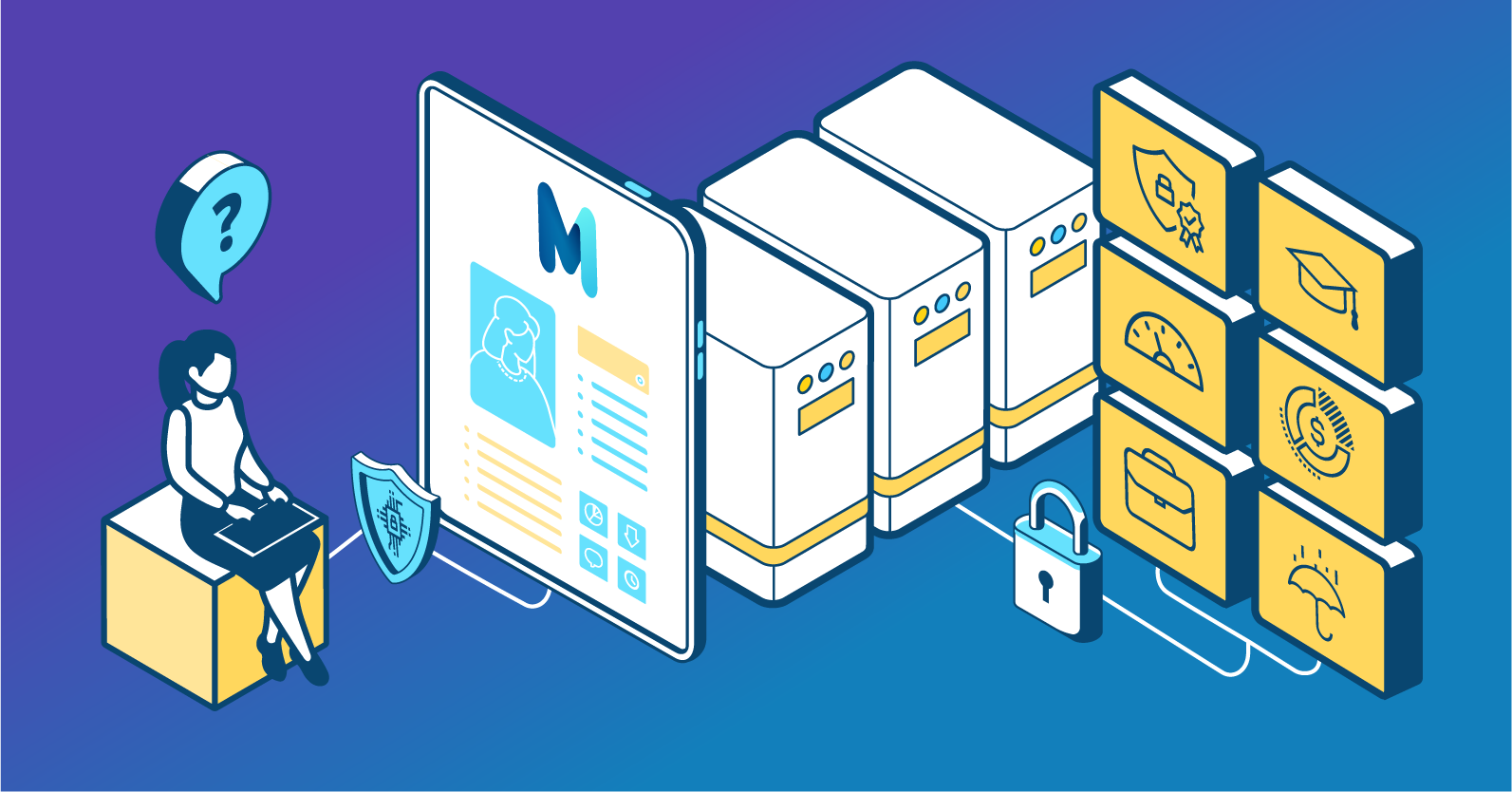Contents
- What are AI agents?
- What is the Model Context Protocol (MCP)?
- How AI agents differ from MCP
- Why MCP matters for data verification
- AI Agent vs. MCP: A complementary, not competitive, relationship
- MeasureOne’s MCP Server adds a layer of intelligence for verification workflows
What began as pattern-matching and text, image, and video generation is now a world of autonomous reasoning systems. This is a new era of AI tools, capable of planning and gathering information, and, maybe most significantly, taking actions or making decisions based on that information.
Two terms have quickly risen in conversation around integrating AI: AI agents and Model Context Protocol (MCP).
At first glance, they may seem interchangeable. Both appear in dialogue about task automation, efficiency, and next-generation AI infrastructure. But the truth is that AI agents and MCP solve different problems, and understanding their relationship is key to building reliable data workflows.
This distinction is especially critical in industries that depend on consumer data verification, like insurance, lending, property management, workforce reimbursement, and more. For these organizations, the workflows are sensitive, data-heavy, and require utmost accuracy. AI agents and MCP will play a part in their success. So what is the difference?
What are AI agents?
AI agents represent a new step in AI capability. Instead of simply generating responses, they can reason about goals, break them into smaller tasks, research or retrieve information, take actions, evaluate results, and even iterate to improve outcomes.
That is to say, an AI agent doesn’t just answer a question, it tries to solve an objective.
Agents are particularly powerful when goals are open-ended: “create a financial summary from these statements,” “summarize this customer’s issue and recommend next steps,” or “draft a code module to integrate with an API.”
The excitement around agents stems from autonomy. They mimic how a human might think through a problem, assess information, and execute. However, autonomy is not intelligence. The quality of an agent’s output depends heavily on access to real-world data. Without reliable data feeds, even sophisticated agents resort to speculation. In consumer-data-driven workflows, speculation is a non-starter.
Model Context Protocol (MCP) changes that equation.
What is the Model Context Protocol (MCP)?
The Model Context Protocol is a standardized way to connect AI models to external tools and data sources. It describes how models can interact with systems securely and consistently. That means there are no ad-hoc API wrappers, no brittle integrations, and no complicated handoffs.
With MCP, an AI model can request data, perform context-specific actions, and return results in predictable formats. Instead of guessing, an AI system can reliably access business-grade information.
Developers and enterprises have gravitated to MCP because it solves a foundational problem: models need context. The smarter the AI, the more valuable real-time data becomes.
And, to be clear, MCP does not replace agents. Instead, it provides the connective tissue that allows them to operate with accuracy and control, especially in regulated data environments.
If agentic AI represents the “thinking,” the MCP Server represents the “knowing.”
How AI agents differ from MCP
The simplest way to understand the difference is to imagine the division of labor:
- An AI agent is the decision-maker: it interprets a goal, decides how to pursue it, and runs through steps to completion.
- MCP is the data and action interface: it provides the real-world context and execution path needed for the agent to do its job responsibly.
An AI agent can choose what data it needs, but MCP determines how (and whether) it can retrieve that data securely, consistently, and in an enterprise-approved format. Where agents are conceptual and cognitive, MCP is infrastructural and connective. Together, they enable reliable outcomes.
Why MCP matters for data verification
In consumer data verification—maybe that’s confirming employment, validating auto insurance, or reviewing claims—accuracy is fundamental. Traditional automation tools rely on manual review, API stitching, and document parsing, all of which introduce delays and risk.
MCP streamlines these workflows because it provides structured, real-time access to verified data directly from the source. When that capability is delivered through MeasureOne’s MCP Server, businesses gain a direct, repeatable way to power data-driven decisions.
Some benefits include:
- Direct, secure access to consumer-permissioned data
- Standardized integration that reduces engineering lift
- Improved verification accuracy through real-time retrieval
- Faster end-to-end workflows for both teams and customers
- The ability to plug into AI agents or other automation frameworks without re-architecting
Instead of building custom connections or relying on error-prone extraction tools, teams can trust that the data is accurate at the moment of decision.
AI Agent vs. MCP: A complementary, not competitive, relationship
It’s easy to frame AI agent vs. MCP as a competition, but the two are fundamentally complementary.
Agents are increasingly capable of handling autonomy and workflow orchestration. MCP, meanwhile, gives them trustworthy access to real-world data. Without MCP or a similar connective layer, agents operate like humans without internet access: creative, but uninformed.
With MCP, they become productive.
This is especially valuable for organizations trying to scale AI responsibly. Financial institutions, insurance companies, and HR platforms can’t rely solely on generative inference; they need systems that know rather than guess.
MeasureOne’s MCP Server adds a layer of intelligence for verification workflows
MeasureOne’s new MCP Server anchors AI-driven verification in real-world data. It connects models and agents to verified consumer information through an industry-standard protocol (credentialed data), allowing businesses to automate with confidence.
The result is a future-ready approach to verification:
- More accurate
- Easier to integrate
- Faster to scale
Your team no longer needs to choose between accuracy and automation. With MeasureOne’s MCP infrastructure, you get both. Try it today.

